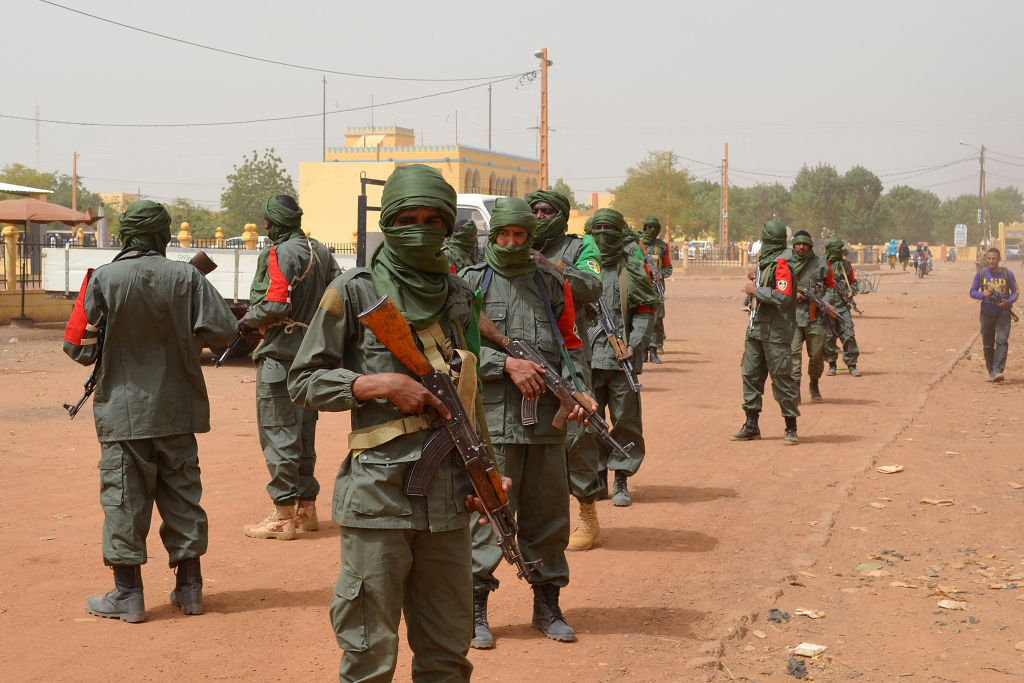ADF STAFF
A convoy composed of Malian Armed Forces (FAMa) troops and Russian mercenaries rode in military vehicles, armored vehicles, trucks and pickups as they headed toward the northern town of Tinzawaten in late September.
Their mission was to recover the bodies of some of the 47 FAMa Soldiers and 84 Russian Wagner Group mercenaries killed in July during a fierce three-day battle with fighters with the al-Qaida-linked Jama’at Nusrat al-Islam wal-Muslimin (JNIM) terror group and Tuareg rebels with the newly formed Strategic Framework for the Defense of the People of Azawad (CSP-DPA), according to The Africa Report.
Fought near the northern border with Algeria, the battle accounted for Russia’s biggest loss in Mali since it deployed there in December 2021 and the worst defeat for FAMa since hostilities resumed in August 2023.
“Before this ambush, the CSP-DPA and JNIM had been unable to effectively counter the Wagner Group and FAMa as they advanced toward the far north of [Tinzawaten], where many people had fled from military operations,” according to Armed Conflict Location and Event Data (ACLED) analysis in August. “The successful ambush could strengthen the confidence and determination of CSP-DPA and JNIM but may also provoke a retaliatory response from Wagner forces.”
That had not happened, as of early November. Mali’s Army spokesperson Col. Maj. Souleymane Dembele told Reuters the defeat had no effect on its goal of “restoring the authority of the state throughout the country.”
Although the Malian Army maintained that the September operation’s main purpose was to recover bodies, some observers believe it was also an attempt to erase the disgrace of the July defeat.
The CSP-DPA mocked the body-recovery effort as a “forced retreat” as the Soldiers and mercenaries did not engage in battle during the nine-day operation at a time when both sides were preparing for more fighting.
“Military sources admit that retaking Tinzawaten and securing the Algerian border were important objectives but that conditions were not right to achieve these goals,” Manon Laplace and Aly Asmane Ascofaré wrote in The Africa Report.
Mali’s military junta has repeatedly pledged to restore security to the country after using the terror threat as justification for coups in 2020 and 2021, but the violence has gotten worse.
Last year, Mali recorded a 38% increase in violence targeting civilians, according to ACLED. Deadly clashes among security forces, terror groups and Tuareg rebels have continued this year and have spread to new areas, which suggests that FAMa and Russian fighters may lack resources and an appropriate strategy.
The body-recovery operation was conducted a couple of weeks after JNIM attacked a military training base and airport in Bamako, the national capital, where terror attacks are uncommon. The BBC reported that at least 60 and perhaps as many as 100 people were killed in Bamako, with another 200 or more wounded. Video shot by terrorists shows a jihadist placing a burning rag in the engine of the presidential jet, along with terrorists exploring a terminal at the airport and firing shots as they approached planes belonging to the United Nations.
Malian drones and warplanes are at the airport, which is a base for Russian mercenaries.
“Wagner has committed so many atrocities against civilians that JNIM is focusing on them in an effort to win hearts and minds,” Wassim Nasr, a Sahel specialist and senior research fellow at the Soufan Center, told The Washington Post. “And why wouldn’t they? It’s easy. It will help them recruit, and it is already helping them recruit.”
The attack unfolded on the 64th anniversary of the founding of Mali’s gendarmerie and came days after junta leader Assimi Goita said the Army had “considerably weakened armed terrorist groups,” Reuters reported. The United Nations described the incident as a “strong show of force” by JNIM and that “the attack and specific target was likely planned in advance.”
“In my personal opinion, this is seriously impacting [the junta’s] credibility on the security front,” a diplomat in Bamako told Reuters. “We’ll see how the population reacts to these events. Either they will support the regime against the jihadists or start wondering if they have the right protection they deserve.”
Jean Herve Jezequel, Sahel Project Director at International Crisis Group, said the attack was more ambitious than previous JNIM raids.
“It seems the jihadists demonstrated capacity to hold the airport for some time, possibly multiple hours, which is a huge blow,” Jezequel told Reuters. “Even if it does not ruin all the Malian Army’s efforts to redeploy these last few years, it is a serious blow that stresses the absolute need for serious adjustments in the Malian counter insurgency strategy.”
The post Malian, Russian Forces Return to Tinzawaten After Brutal Defeat appeared first on Africa Defense Forum.


